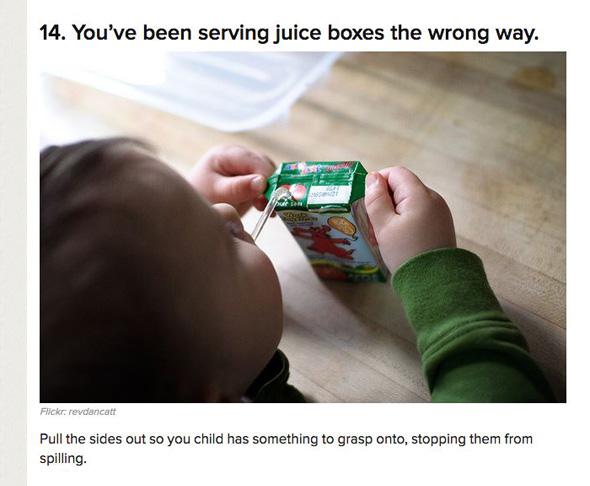Update: BuzzFeed has agreed to pay $500 to the charity of Dan Catt’s choice. See below for details.
Two weeks ago BuzzFeed posted a highly successful listicle “18 Everyday Products You’ve Been Using Wrong.” It went viral, and you can see why. The list is useful, involving household items, some of which you probably use on a daily basis, and has that “of course!” level of enlightenment.
And when I say “highly successful,” I mean it is their most-viewed post in more than two months. Here’s a recent top five:
- “18 Everyday Products You’ve Been Using Wrong”—4,239,456
- “21 Painfully Awkward Band Photos”—2,920,505
- “28 Things That Happened After The Harry Potter Books Ended”—2,615,219
- “Will Smith’s Family Reacting to Miley Cyrus Is Perfect”—1,733,798
- “17 Problems Only Book Lovers Will Understand”—1,374,124
My problem with the “18 Everyday Products” list comes in down at No. 14 …
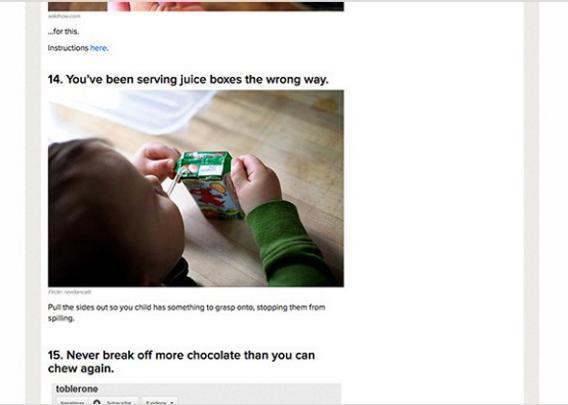
Courtesy of Dan Catt
… where they used my copyrighted photo without permission.
1. Why I shouldn’t really be pleased they used it.
This comes up quite often with copyright on the Internet in general: But you should feel proud that they’ve used your crappy photo. Now it’s been seen by more than 4 million people. Lots of people who wouldn’t normally see you work now have. You should be thanking them.
Well, OK, let’s entertain that thought for a moment. Even though Gabby, the listicle’s creator, has given me a link, she’s done it in about the worst way possible. Yeah, they’ve linked it to this page, the photo download page rather than the actual photo page on Flickr.
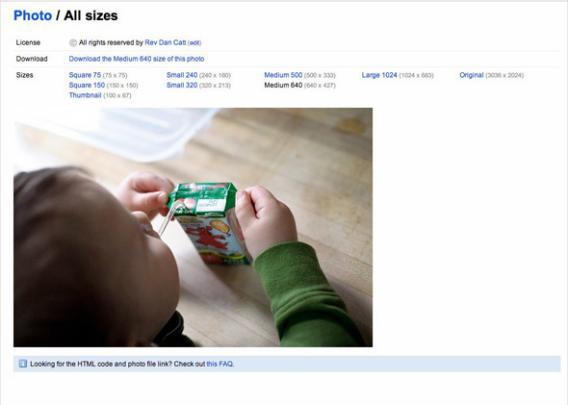
Courtesy of Dan Catt
So will any of those 4 million possible click-throughs count as views on my Flickr page? No. Will they see the other photos on either side of my photo in context, the tags used, the sets I’ve put it in? The description, notes on the photo, and comments added to the page, even my icon and details about me?
Nope.
If you really want to get picky about it, BuzzFeed, which makes money with sponsorships and ads placed next to content, has linked to a Yahoo page that doesn’t show ads rather than the main page that does. They’re making money from their own ads while keeping click-throughs away from ads of the original host.
It’s almost as though they’ve tried to link back in the most lame-assed way possible. Thanks for taking those 4.2 million views and adding hardly a single one to my own page.
2. It’s not public domain.
When BuzzFeed got into hot water earlier this year about copyright, the website’s CFO said that “[they] try their best to find image sources, but that it can be difficult and he assumed since the photo’s been all over the internet that it was in the public domain.”
Now the public domain is a very specific thing. A copyright owner actively has to choose to place something into the public domain, and since most people don’t understand public domain, including apparently the CFO of BuzzFeed, this hardly ever happens. (The other time content enters the public domain is several decades after the owner’s death.)
You see when you assume that because the “photo’s been all over the internet” that it was in the public domain, what you really mean is, Oh look, this was taken with a digital camera so almost certainly someone owns the copyright—we just can’t find them, so better not use it then. What you have there is an “orphaned work,” laws for which are being shaped up in both the U.K. and U.S. but aren’t quite ready yet, which basically means knock that shit off.
This is of course ignoring the fact that they could easily find the owner, as they sort of linked back to my page and my photo hadn’t been all over the Internet. Well, at least until now, because now it’s popping up all over the place without any links back, and I have to start DMCAing Tumblr to regain control of my own photo.
3. It’s not transformative either.
Over on the Atlantic, BuzzFeed founder Jonah Peretti claims that throwing photos into a list is transformative and therefore falls under fair use.
So just how transformative is this use of my photos? Well, here a member of the BuzzFeed staff has collated a list of handy tips on how to use items or features about them that make them easier to use. It’s a genuinely useful list, and I even learned something about Tic Tacs.
My photo is titled Parent Hacks: The Juice Box Flaps and goes on to say “Neat trick to prevent them from squirting juice all over themselves when trying to pick it up, which is what happens if they grab the box itself.” (Although you wouldn’t see that if you clicked the link from BuzzFeed.) See what they’ve done is transform it from a handy hack about how to get a child to pick up a juice box so they don’t squirt the juice out to a handy tip about how to get a child to hold a juice box so they don’t spill the juice.
The transformation has created something utterly new. Well done, geniuses at BuzzFeed, for bringing something new to the table.
Hey, BuzzFeed, have you tried maybe producing an album called 18 Tracks That Got to No. 1 on the Billboard Charts in 2013 without licensing the actual music yet? Why not give that a go, and let me know how it works out for you.
4. It ain’t about the DMCA.
Digital Millennium Copyright Act, or DMCA, gives sites like Tumblr, Pinterest, and YouTube a defense on “safe harbor” grounds from copyright lawsuits and claims for the content uploaded by their users, which is fair enough. As YouTube can’t monitor everything, the DMCA is a way for copyright owners and sites like YouTube to sort-of kind-of get along.
BuzzFeed has community contributors—hey, I’m one at the moment—and they have a user agreement that suggests not uploading copyrighted content, noting that BuzzFeed can’t really be held responsible for content uploaded by their members. That’s what the DMCA takedown process is in place for.
However, in this case, my photo was downloaded, reuploaded, and subsequently used by a paid member of BuzzFeed staff. Staff who are supposed to be given guidelines on how and when to use licensed and Creative Commons–licensed photos.
5. License that photo!
On Slate Jonah Peretti goes on to say he “would love if every image contained some secret metadata and a way to license that image. But the practical reality is that it is pretty challenging.”
Hey, was the fact that the photo came from Flickr and you used my name and threw in a kinda link just not quite secret enough for you? I know, figuring out how to license the photo you were going to use in your chart-busting, ad-money-making list was just too taxing for you, I guess?
BuzzFeed pays Reuters, AP, and Getty for rights to their photo libraries, but contacting an individual creator is far too much work. Yay.
6. Creative Commons photos.
You see, I’m not against BuzzFeed or others reusing content or making money; indeed I’m all for it. Which is why around 25 percent of my photos on Flickr have a Creative Commons (CC) license.
Here’s a similar photo, shot from the same sort of angle, featuring one of my kids using some counting rods …
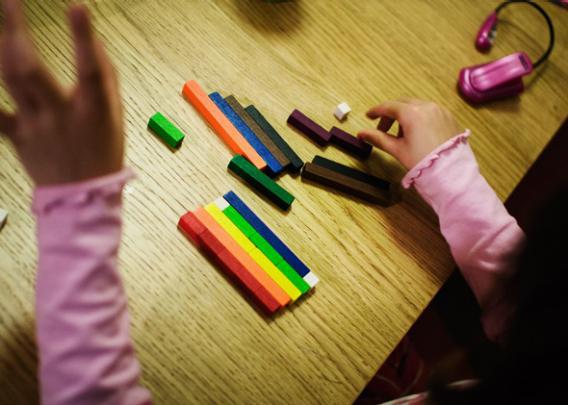
Courtesy of Dan Catt
… which I knew would be useful for various Montessori websites, so I gave it a Creative Commons license. BuzzFeed, go right ahead and feel free to use that one. As a general rule, I Creative Commons-license all my photos unless they have my family or a recognizable person in it.
7. Spambots are better Internet copyright citizens than BuzzFeed staff.
This is my most-used Creative Commons photo …
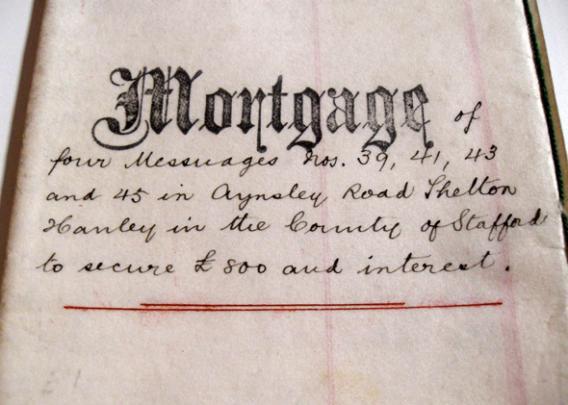
Courtesy of Dan Catt
… because for some obscure reason mortgages are a hot topic in the U.S. at the moment and have been for a few years. Who knew!
When we bought our house, we found this document along with the full history of the house tucked into a box hidden under a bookshelf. I knew it was something uncommon and probably interesting to other people, so I added a liberal Creative Commons license to it so others could happily use it where they might have had trouble finding a suitable stock image.
Turns out there’s a whole bunch of spambots out there turning out blog posts of regurgitated junk, interlinking to one another and generally trying to game search engines.
And you know what? Even they know to search Flickr for Creative Commons–licensed photos, and generally they even correctly attribute the photo and link back.
That’s right: Slimy SEO spam-generating bots are better at correctly using my photos than BuzzFeed staff.
8. The photo isn’t worth very much.
So hey, I’m not like this guy, going after $3.6 million. The photo of my son isn’t registered with the U.S. Copyright Office, which would allow me to claim damages of up to $150,000. But it’s just not worth that much. If I’d taken a photo of some particularly newsworthy or unique event and I wanted to be able to license the photo to news agencies without them just taking it, then yeah I’d register it.
That doesn’t mean it’s worthless though.
As the kids grow up, I’ve been collecting various “parent hacks” with the aim of one day producing a piece titled “10 Neat Things I Learnt While Being A Parent.” Now one of those things has been splashed all over the Internet, which kind of devalues the usefulness of the list I was planning. There’s even a chance people will think I’ve copied BuzzFeed or wherever they’ve now seen the photo.
I put a more relaxed license on the photo of my daughter using counting rods because I wasn’t planning a post about counting rods. I kept full copyright on the photo of my son using the juice box because I did have plans for it.
So thanks for messing that up, BuzzFeed. You could have just asked like you’re supposed to.
9. The U.K. has a new photographers’ “streamlined” small-claims track.
Amateur Photographer has all the details and the instructions.
That’s right: In the U.K., if I can document copyright infringement (and this totally is) and can’t reach an amicable agreement—such as BuzzFeed not paying or responding to my invoice or letters of warning—then I can plunk down my 50-pound fees (for claims of 500 pounds or less).
No lawyer needed, and it can all be dealt with on paper without a court appearance if the judge decides it’s an open-and-shut case.
Of course BuzzFeed may choose to ignore the invoice or dispute the claim, but then they have to turn up in court to do that, which is going to cost them more than the invoice.
10. Bonus: Now they change the photo.
And since I asked BuzzFeed where to send my invoice, they’ve changed the image, 18 days and 4.2 million views later.
Good thing I’ve got screenshots.
And now I feel a bit better.
Update, Sept. 13: BuzzFeed agreed to pay the amount of my invoice, $500, to the Chordoma Foundation charity.
John Gara, the art director at BuzzFeed, gave me a call (we exchanged numbers) shortly after I made this post. We discussed a number of things about BuzzFeed, copyright, and photography. I asked if they’d pay the money I’d be invoicing them to charity instead. I’ve supported the Chordoma Foundation before and BuzzFeed were more than happy to do so. Thanks, John!
They donated the money Thursday. I would have updated sooner but was having surgery then (boo). (I’m fine.)
So some good has come out of this. A charity is $500 better and maybe just maybe BuzzFeed staff will review their guidelines.
